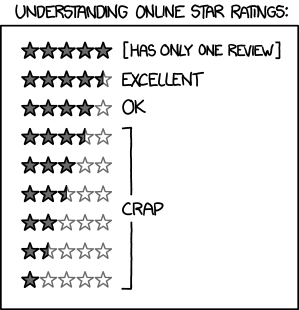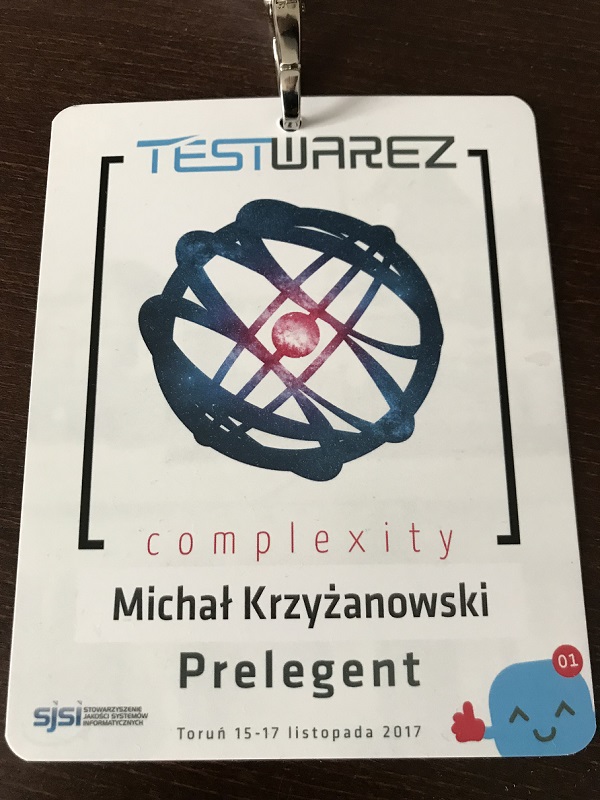TestWarez 2017 summary
Three days and two nights of presentations, discussions, chats, and fun!
This generally sums up most of the conferences, so how was this year’s edition of one of the most popular Polish testing events, TestWarez?
The conference
I will start unusually, straight away with a summary - I really enjoyed the conference, I brought many ideas back with me and I am even more motivated to present and speak.
Oh, and the party after the first day was a blast - thanks, AmberTeam ;)!
Now, time for some details!
The conference took place in Toruń, at Copernicus Hotel. As for the venue itself, it was a very nice location, only a few minutes walk from the Old Town. There was enough space to comfortably cruise between presentations and to not get lost or overwhelmed. The catering provided enough food for people hungry for not only knowledge, coffee, and beverages, so important for those that overdid it the previous evening ;). There is nothing worse than a hungry crowd!
The attendee perspective
On the first day of the event, multiple workshops took place.
I attended the full-day one, ‘DevOps in the organization’ led by Tomek Pająk. Tomek presented great examples and provided many questions requiring you to challenge your current organization in the context of DevOps readiness and awareness. The workshop gave me a lot of ideas to bring back to my team and company and hopefully, I will succeed in implementing at least a couple of them. Additionally, I had a few interesting debates that were triggered after the workshop.
The next two days were filled with presentations and discussion panels.
This year, the main theme of the conference was ‘Complexity’ and, to be honest, I am not sure if the agenda reflected it fully. And I am writing this based also on opinions of other people - my ‘crew’ was a dozen people attending multiple tracks, so I had a first-hand, unfiltered insight on many of them.
In general, the topics were varied, more or less technical, tackling different quality-related aspects, in some cases not related to the software development at all. I understand that it is an event for people with various experience and there ought to be presentations about more basic topics.
Nevertheless, I would love to see more… complex subjects tackled, more advanced ideas presented - even some of my junior colleagues were a bit disappointed in the overall level offered by the conference.
On the other hand, perhaps we expect too much as our processes in the company already include a lot of best practices and we are simply ranting, while the crushing majority thinks differently ;). For sure I will re-evaluate my opinion after all presentations are available online.
Fortunately, during other events, I also learned that the biggest opportunity to feed new ideas into that brain of yours lies in the possibility to share your experiences with other attendees - between the panels or sometimes even instead of them when you are sucked into the discussion. And from this side I was more than happy with my overall experience - I had the chance to meet and talk with people dealing with similar or even more advanced problems and it sparked many ideas in my head and made me re-think a few things.
I think one of the most complex parts of the conference was choosing your way through agenda - 5 simultaneous tracks were a bit too much and with the number of people at the event, it was a silent competition between speakers to get a healthy audience. Sure, everything has been recorded but because of this, some may have spoken to half-empty rooms.
Another thing I was disappointed in, was that majority of presentations were in Polish. Alright, I get that it is a Polish conference, organized by Polish organization but I think it is a missed opportunity for allowing a wider audience to attend the event and raising its rank in general.
Oh, by the way - during one of the lightning talks, a sort of a Polish version of SeleniumConf was announced! Check it out at http://conselenium.pl/
When it comes to the presentations themselves, I want to mention two of them:
-
‘Testing artificial intelligence’ by Paweł Noga
It was one of the presentations that got the audience engaged the most due to some controversial ideas presented by Paweł: AI replacing us in most of the areas as we know today, even in software development. It also shed some light on starting an AI testing career.
-
‘A proper gun makes testing fun’ by Tomek Dubikowski
As usual, Tomek delivered again :). His talk about performance testing using Gatling was to the point, fun and included successful live coding! It was a great source of inspiration because…
The speaker perspective
… I attended TestWarez as a speaker too! And I want to add a bit of information how the conference looked from the other side.
In terms of organization, there is definitely room for improvement for the responsible team - we did not receive a full schedule when to submit the presentation and the article related to the talk, when we will receive any speaker agreements etc. Well, we did - a couple days before the event. Receiving it shortly after getting accepted would help a lot to actually keep up with the deadlines. There were also some issues with the agreement itself but were solved promptly.
What could use some improvement too, was around speakers support. Some details became apparent only after observing others presenting and I think they could have been provided by the organizers in a brief ‘speaker guide’.
Now, about the conference application (I do not mean the official mascot here :)). Having the possibility to browse through the agenda and speakers info was great, although it took a while to get used to navigating around the packed schedule.
What I really dislike though is the rating system included over there. And I say that also from an attendee perspective.
A 5-star rating was used in the application and, at least for me, this resonates a bit with the way app stores work. xkcd pretty much summed it up in this comic:

Due to the above giving a 3 ( = ‘Cool!’ rate) felt kinda wrong, while on the other hand what a 4 (= ‘Very good!’) actually expressed? Now, I understand that it is a somewhat standard system but it virtually gives a speaker no information about the talk whatsoever. Did the content suck? Were the expectations after reading the brief not met? Was the way of presenting things unappealing? Why not provide a way of addressing these things directly?
People tend to be lazy (and it’s a natural thing, we tend to take the path of least resistance everywhere) and I guess only a handful of people provided some additional feedback.
My talk
I was presenting at smaller events before but doing it on a conference took it to the next level for me. Naturaly, it provided an additional level of stress but also gave me an opportunity to reach a wider audience.
After my presentation (Continuous Delivery and beyond), I knew immediately what could have been done better and the feedback I received reassured me in that (thanks Kinga)!
Fortunately, my talk sparked some discussions and I spent next 2.5 hours talking to different people. One of the most gratifying moments was when one of the listeners said that he actually got some new ideas from my presentation and is bringing some fresh knowledge back with him - and that is one of the most important reasons why I am reviewing open Call for Papers at the moment and cannot wait to do it again!
Other summaries
Other people have posted their summaries already. Check them out for different perspectives on the event from:

